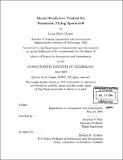Model predictive control for formation flying spacecraft
Author(s)
Breger, Louis Scott, 1979-
DownloadFull printable version (6.986Mb)
Other Contributors
Massachusetts Institute of Technology. Dept. of Aeronautics and Astronautics.
Advisor
Jonathan P. How.
Terms of use
Metadata
Show full item recordAbstract
Formation flying is an enabling technology for many future space missions. This thesis addresses some of the key dynamics and control issues expected in future missions by pursuing two areas of advancement: extensions of relative linear dynamics models and assessment and mitigation of sensor noise effects on control systems. Relative dynamics models play an important role in finding drift-free initial conditions for spacecraft formations and for designing feedback controllers. This thesis presents extensions to the equations of relative motion expressed in both Cartesian reference frames and Keplerian orbital elements, including new initialization techniques for widely spaced passive apertures with very general formation configurations. Also, a new linear time-varying form of the equations of relative motion is developed from Gauss' Variational Equations, and the linearizing assumptions for these equations are shown to be consistent with typical formation flying scenarios. The second area considers the impact of sensor noise, predicted by several researchers to have a significant effect on the fuel-use for formation flying control. This thesis analyzes the impact of carrier-phase differential GPS sensor noise using a new analytical method for predicting the effects of disturbances on a model predictive control formulation. Previous work used an "open-loop" planning approach to achieve robustness in the presence of sensor noise, but was limited to short planning horizons. This thesis employs a "closed-loop" approach which accounts for future replanning, enabling longer planning horizons and more general terminal constraints. This MPC formulation guarantees the robustness (cont.) of the planning system to both process and sensing noise with fuel costs that are shown to be comparable to the previous approach.
Description
Thesis (S.M.)--Massachusetts Institute of Technology, Dept. of Aeronautics and Astronautics, 2004. Includes bibliographical references (p. 105-114).
Date issued
2004Department
Massachusetts Institute of Technology. Department of Aeronautics and AstronauticsPublisher
Massachusetts Institute of Technology
Keywords
Aeronautics and Astronautics.